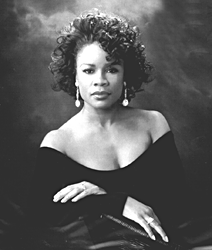

Oberlin graduate Denyce Graves is living the dream of every Conservatory student. As a young mezzo-soprano whose professional history includes performances both as a concert soloist and in lead roles with major opera companies around the world, Graves is the definition of the modern opera diva.
On the stage of Finney Chapel Tuesday night, Graves' moving performance of a diverse and difficult program was handled with all the poise that her reputation would assume. Her presence was self-assured and captivating. Her voice never strained and was clear and powerful in every range. She executed the with the kind of emotional intensity and intimacy that constantly engaged the audience and, throughout the evening, never seemed forced or unbelievable.

Highlights from the first half of the program included Francesco Santoliquido's Tres poesie persiane (Three Parisian Poems) that Graves handled with a very playful confidence, and a song set by Puccini that displayed Graves' ability to cover a huge emotional range. The Puccini songs were particularly moving, using text that ranges in content from the singing of a little bird on a branch, to questions of human mortality. Pianist Warren Jones accompanied these songs with unparalleled sensitivity and maturity.
Jones, whose bibliographical notes are a veritable who's who of the opera world, was stunning all evening, displaying the kind of subtlety and restraint that an artist of Graves' stature demands. The dynamic on stage was so unified that communicating to the audience was never a problem, and it was this chemistry that was completely responsible for the performers' ability to convey the content of the program with such poignancy.
The patience of the duo was tested after intermission when a Brahms song set was interrupted by a high pitched whistle interrupted the performance. Jones paused to wait for it to stop, and eventually had to address the audience. "I don't know where the high pitched hum is coming from, but please stop it," he said, whereupon the whistle stopped and the recital continued. It was perhaps one of the only memorable flaws in the evening, and it was handled so professionally by Jones that, if anything, it only made their presence as performers greater.
Siete Canciones Populares Espaņolas (Six Popular Spanish Songs) by Manuel DeFalla was perhaps the greatest display of the communication between Graves and Jones. Starting with the very humors and charismatic "El Paņo Morun,"Graves and Jones performed these six folk songs with a great amount of poise and spirit.
The DeFalla served as a springboard for the remainder of the program, which ended with the somewhat standard inclusion of four spirituals. Hearing these familiar songs, which included a light arrangement of "Swing Low Sweet Chariot" by Marvin Mills, come from an opera singer is a unique experience.
One might think that songs so deeply rooted in the African-American folk tradition would be out of place ending a program of Western Classical song sets, but Graves and Jones were able to escape the standard problems of rigidity that might plague less-experienced performers. Hearing a classical musician perform folk music is odd, and performances of this sort are all too often square and too heavily technical to be really enjoyable, but Graves' obvious love for the music made the pieces successful.
The program ended with these spirituals, but Graves kept going, performing four encores. These songs, including "I got plenty of nothin'" and a comedic, satiric version of "This Joint is Jumpin'," were delivered with a kind of relaxed charm that displayed the duo's love of performance and gave insight into their ability to entertain in a relaxed, impromptu situation. "I never know which one we're going to do until he starts it," Graves admitted during the Jones' introduction to the second encore.
After the third encore's standing ovation it seemed that nothing could end the evening more aptly than Graves' final selection from Carmen. Graves' performance of this aria was an exhilarating conclusion to the recital and nothing could have ended the night better.
The artist recital series brings world-renowned performers and amazing performances to Oberlin every year, but few performers have the ability to completely entrance an audience the way that Graves did. As one of Oberlin's most widely recognized graduates and one of the premiere figures in the opera world, Graves deserves every bit of praise that is constantly bestowed on her. The vitality and poise of this performance was only more evidence of what we already knew: that Graves is of the highest caliber of performing artists anywhere and that she is a diva who will not soon be forgotten.
Oberlin Grad Comes Home: Denyce Graves, opera star, returns to her alma mater. (photo courtesy Colombia Artists)
Copyright © 1999, The Oberlin Review.
Volume 127, Number 21, April 23, 1999
Contact us with your comments and suggestions.